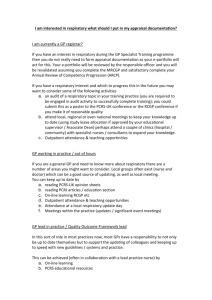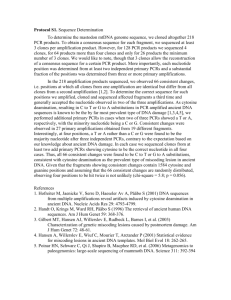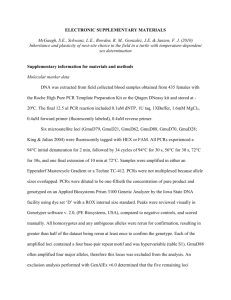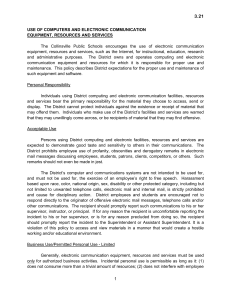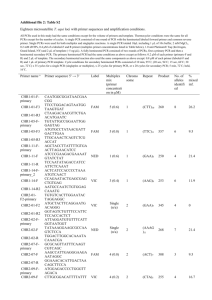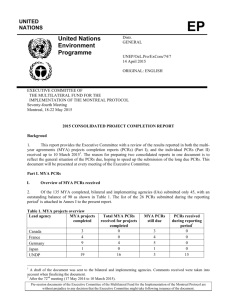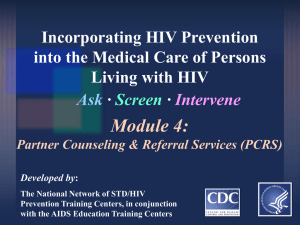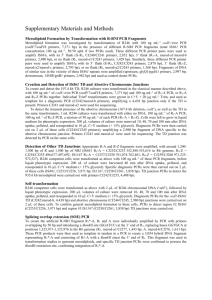Communications Draft
advertisement
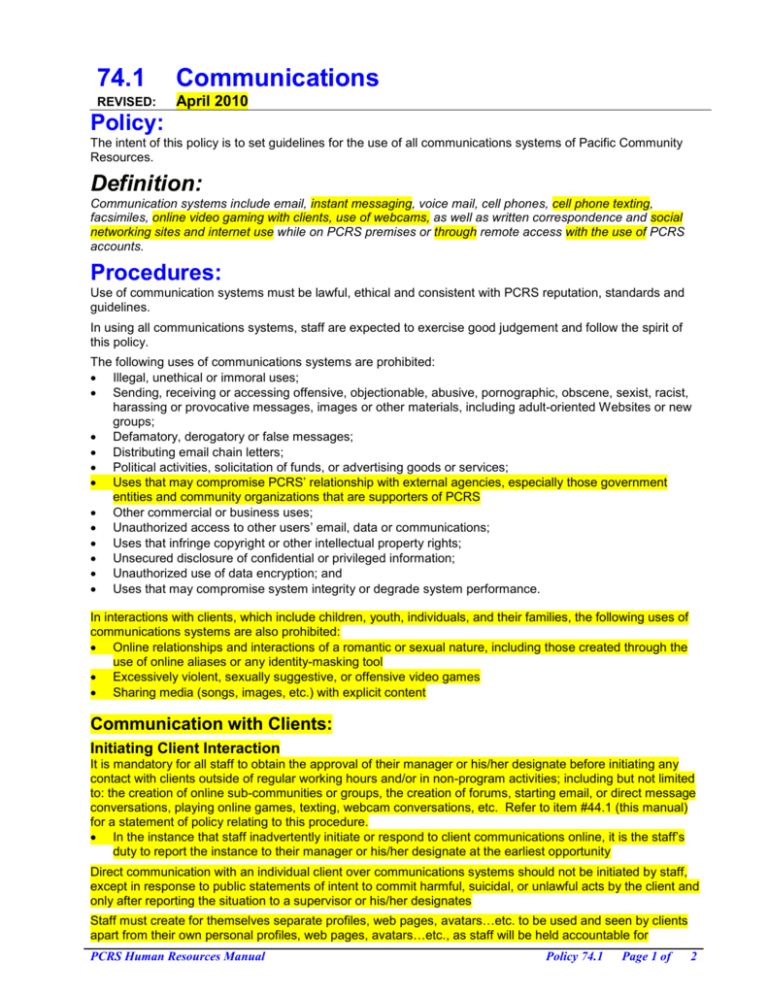
74.1 Communications REVISED: April 2010 Policy: The intent of this policy is to set guidelines for the use of all communications systems of Pacific Community Resources. Definition: Communication systems include email, instant messaging, voice mail, cell phones, cell phone texting, facsimiles, online video gaming with clients, use of webcams, as well as written correspondence and social networking sites and internet use while on PCRS premises or through remote access with the use of PCRS accounts. Procedures: Use of communication systems must be lawful, ethical and consistent with PCRS reputation, standards and guidelines. In using all communications systems, staff are expected to exercise good judgement and follow the spirit of this policy. The following uses of communications systems are prohibited: Illegal, unethical or immoral uses; Sending, receiving or accessing offensive, objectionable, abusive, pornographic, obscene, sexist, racist, harassing or provocative messages, images or other materials, including adult-oriented Websites or new groups; Defamatory, derogatory or false messages; Distributing email chain letters; Political activities, solicitation of funds, or advertising goods or services; Uses that may compromise PCRS’ relationship with external agencies, especially those government entities and community organizations that are supporters of PCRS Other commercial or business uses; Unauthorized access to other users’ email, data or communications; Uses that infringe copyright or other intellectual property rights; Unsecured disclosure of confidential or privileged information; Unauthorized use of data encryption; and Uses that may compromise system integrity or degrade system performance. In interactions with clients, which include children, youth, individuals, and their families, the following uses of communications systems are also prohibited: Online relationships and interactions of a romantic or sexual nature, including those created through the use of online aliases or any identity-masking tool Excessively violent, sexually suggestive, or offensive video games Sharing media (songs, images, etc.) with explicit content Communication with Clients: Initiating Client Interaction It is mandatory for all staff to obtain the approval of their manager or his/her designate before initiating any contact with clients outside of regular working hours and/or in non-program activities; including but not limited to: the creation of online sub-communities or groups, the creation of forums, starting email, or direct message conversations, playing online games, texting, webcam conversations, etc. Refer to item #44.1 (this manual) for a statement of policy relating to this procedure. In the instance that staff inadvertently initiate or respond to client communications online, it is the staff’s duty to report the instance to their manager or his/her designate at the earliest opportunity Direct communication with an individual client over communications systems should not be initiated by staff, except in response to public statements of intent to commit harmful, suicidal, or unlawful acts by the client and only after reporting the situation to a supervisor or his/her designates Staff must create for themselves separate profiles, web pages, avatars…etc. to be used and seen by clients apart from their own personal profiles, web pages, avatars…etc., as staff will be held accountable for PCRS Human Resources Manual Policy 74.1 Page 1 of 2 discrepancies between how they present themselves and how they ought to in accordance with the policies outlined in this manual, and in all other Agency manuals, in all interactions online Client Privacy Because of the nature of the client-staff relationship and the ambiguity that can arise in communications systems, particularly over the internet, all information about clients acquired through communications systems are to be defined as “professionally acquired,” and thus, can only be disclosed when properly authorized or under legal or professional obligation to do so, in keeping with policy items B4.1a and B4.1b in the Agency Policy and Procedures Manual Online websites and all other forums of electronic communication are considered to be areas of public space no matter what sort of promise for security or confidentiality is guaranteed by webmasters or administrators. With this in mind, staff are not to discuss clients or share private information about clients with anyone over the internet. (see section B5.1, Agency Policies and Procedures Manual) Emergency Situations Employees are prohibited from taking action through communications systems against incidents of suspected abuse, neglect, or harm of any sort to a client and should seek to resolve the situation through the employee’s Agency program or standard Agency protocol. When in doubt, staff should report the situation to their supervisor or his/her delegate. All statements made and observed by staff through communications systems in regards to criminal activity or child protection are to be taken seriously, and thus, there is a civil responsibility to report such information to the Police. Ideally, the individual being reported should be informed that the reporting is taking place. However, under some circumstances this may not be the best plan. The program supervisor must be kept informed of all situations involving serious crime or the police. Personal Use: Communications systems may be used for personal purposes (e.g., to send and receive email, voice mail messages of a personal nature, to access the internet for personal use); provided that in the opinion of PCRS, those uses do not interfere with the organization’s business and do not compromise the integrity and efficiency of the communications systems, the organization’s professionalism or its reputation. All personal uses of the communications systems must comply with this policy and all other policies, procedures and guidelines. It should be carefully noted that all communications systems, data and uses including email, voice mail, and internet are not private and are subject to access and control by PCRS. Third Party Access: Non-employees are not permitted to use or access the communications systems, including the internet and email accounts, without prior written authorization from the Communications Manager. Non-employees are permitted to utilize the agency communications systems when it relates directly to the reasons for service. Examples of this would be: participants utilizing Resource Room computers, using the fax to send and receive relevant information (e.g., resumes), and using the phone for job search and other program relevant purposes. Non-employees are not permitted to utilize the agency email or voice mail accounts without prior written authorization from the Communications Manager. Confidential Communications: - Internal Email - Internal email is confidential and for internal use only. Internal email may not be distributed to persons outside the organization unless such distribution is clearly authorized by the author of the email. - External Email - External email and data transmission is not secure or private unless it is encrypted. Email and other data sent externally will pass through many computers and systems that are not under PCRS control, and may be subject to unauthorized access. For this reason, confidential email or other data should not be sent or received via external email unless it is secured by encryption software and authorized by the Communications Manager. - Internet Data - All data created by staff and displayed on many websites could be utilized in an investigation or subpoenaed as evidence in courts, not only in Canada but also internationally. Thus, staff remain reliable for their use of communication systems and must adhere to the policies presented in this and all other PCRS manuals Privacy: PCRS Human Resources Manual Policy 74.1 Page 2 of 2 Communications systems and all data contained in the communications systems, including email and voice mail, are property of PCRS. PCRS may access, inspect, retrieve, review, ready, copy, store, archive, delete, destroy, distribute or disclose to others (including courts and law enforcement authorities) all communications systems data and uses, including email, voice mail, and internet use, without any further notice as may be considered necessary or appropriate. Employees who want their internet use or email or voice mail communications to be private, should not use PCRS communications systems. It should also be noted that anything done or created through a communications system on work time or for work purposes to colleagues, co-workers, and clients, which include children, youth, individuals, and their families, is also property of PCRS and an employee’s right to access and modify it are contingent upon their employment with the Agency and the approval of their Supervisor (see Employment Termination, this section, below). Staff are prohibited from accessing work-related websites and social networking pages, communicating with clients through communication systems, or using their professional communication system accounts outside of work hours. Email Protocols: Email has the same legal and practical effect as other written communications. Users should thus exercise the same good judgement and discretion when sending email as they would when sending a form letter, written memorandum or other correspondence. Email sent via PCRS communications systems reflects the image of employees and the organization. Accordingly, all email messages must be consistent with the organization’s professional reputation and standards. Employment Termination: Employees who leave PCRS no longer have any right to any communications systems data, including email messages; nor will they be allowed access to the organization’s communications systems and its internet accounts. Compliance: Use of communications systems is governed by this policy as well as all other policies that guide the conduct of staff. This policy is part of the employment terms and conditions for all employees. It is the duty of staff to take reasonable action with regard to any perceived unethical conduct by any other professional in any form, including those seen through communications systems. Reporting any suspected or observed misconduct to the immediate supervisor is the responsibility of all employees. Any malicious intent in doing so is unethical. It is the duty of supervisors to regularly investigate, if not actively take part in, all online communities, groups, forums, etc. relating to their programs, or designate a staff member of their program to do so on their behalf. Supervisors will investigate all allegations of misconduct and report their findings to the Executive Director Use of the communications systems is a privilege that must not be abused and may be revoked at PCRS’ sole discretion. Failure to comply with this policy may have serious ramifications and my result in disciplinary action up to and including termination. Cross Reference: Email, Voice Mail, Internet Usage (Agency and Programs Policy & Procedures Manual) Confidentiality, Protection of Privacy, and Disclosure of Information (Agency and Programs Policy & Procedures Manual) Children’s Rights (Agency and Programs Policy & Procedures Manual) Child and Youth Care Practitioner’s Professional Code of Ethics (Agency and Programs Policy & Procedures Manual) Code of Ethics (Agency and Programs Policy & Procedures Manual) Employee – Client Relations (Human Resources Manual) EFFECTIVE: REVIEWED/REVISED: APPROVED: October 2004, April 2010 PCRS Human Resources Manual Policy 74.1 Page 3 of 2
